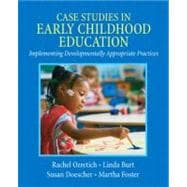
Note: Supplemental materials are not guaranteed with Rental or Used book purchases.
Purchase Benefits
What is included with this book?
| Matrix of Cases | p. x |
| Caring for Infants | p. 1 |
| Mason in Two Different Environments (Infants) | p. 5 |
| Helping Jack be Mobile (Toddlers) | p. 8 |
| Jack's First Day in Family Child Care | p. 8 |
| Using Assessment to Observe Jack | p. 9 |
| Conferencing with Emily, Jack's Mother | p. 10 |
| Implementing the Plan | p. 12 |
| Edward and Keon Invent a Game (Toddlers) | p. 13 |
| Audrey Chooses Different Boots (2 Years) | p. 14 |
| Nurturing Connections in Rafael's New World (2 Years) | p. 16 |
| Rafael's First Day | p. 16 |
| Rafael's Second Day | p. 18 |
| The Library Construction Project (2 Years, First Grade) | p. 20 |
| A Project Emerges for the Meadow Room | p. 20 |
| A Project Emerges for the First Grade | p. 22 |
| Observing Stephen's Aggression (3 Years) | p. 24 |
| "I'm Sorry" (3 Years) | p. 27 |
| Learning to Climb (3-5 Years) | p. 31 |
| Natural Settings: "Does It Tickle?" (3-5 Years) | p. 33 |
| The ABC Train (3-5 Years) | p. 36 |
| How a Child-Centered Environment Nurtures Maya, a Child with Down Syndrome (3-5 Years) | p. 41 |
| Understanding Maya and Recalling Earlier Challenges | p. 41 |
| Curriculum That Helps Maya Progress | p. 43 |
| From Home to Preschool (3-5 Years) | p. 48 |
| The Initial Home Visit | p. 48 |
| Plans for the Initial Classroom Visit at Open House | p. 49 |
| The Open House, Tuesday, 6:30-7:30 p.m. | p. 50 |
| Preparing for the First Day at School | p. 53 |
| The First Day of School | p. 53 |
| Problem Solving and the Blocks (3-5 Years) | p. 55 |
| Robert and the Garage | p. 55 |
| Knocking Down the Blocks | p. 57 |
| Elena's Fears and How She Learns from New Experiences (3-5 Years) | p. 59 |
| Familiar Experiences with Animals | p. 59 |
| Observing Elena | p. 61 |
| The Petting Fair Preview | p. 62 |
| Brent and Cory Need Extra Help (3-5 Years) | p. 64 |
| Mean Talk | p. 64 |
| Separate Classrooms | p. 66 |
| Heather Learns Through Play (3-5 Years) | p. 68 |
| Emiliana's First Report of Child Abuse (3-5 Years) | p. 71 |
| An Activity Close to Amanda's Heart (4-5 Years) | p. 74 |
| Favorite Childhood School Memories | p. 74 |
| Amanda's Plan | p. 75 |
| Amanda Confers with Hana | p. 76 |
| Amanda's Teaching Day | p. 77 |
| Debriefing with Hana | p. 78 |
| Observation Reveals the Issue (4-5 Years) | p. 80 |
| Productive Play with Fairy Dust (Kindergarten) | p. 83 |
| Helping Julian Adjust (Kindergarten) | p. 86 |
| What Is Going on with Julian? | p. 86 |
| Talking with Julian's Mother | p. 88 |
| Using the Information to Help Julian | p. 89 |
| Sharing Akil's Work Sample (Combined First-Second Grade) | p. 91 |
| Why Won't Luke Finish His Work? (First Grade) | p. 93 |
| A Parent's Visit | p. 93 |
| Observing Luke and His Classroom | p. 95 |
| Meeting with Taylor | p. 97 |
| Friday's Meeting | p. 99 |
| Immediate Changes | p. 101 |
| Meeting Again with Elizabeth | p. 102 |
| Why Dante Succeeds in Second Grade (Second Grade) | p. 104 |
| Dante's Family Is Concerned | p. 104 |
| Dante's Parents Observe | p. 108 |
| Involving Children (Second Grade) | p. 116 |
| William and Nashawna and the Ocean Animals Project | p. 116 |
| William Leads a Family Conference | p. 121 |
| Lecia and the Standardized Tests (Third Grade) | p. 125 |
| Glossary | p. 132 |
| Table of Contents provided by Ingram. All Rights Reserved. |
The New copy of this book will include any supplemental materials advertised. Please check the title of the book to determine if it should include any access cards, study guides, lab manuals, CDs, etc.
The Used, Rental and eBook copies of this book are not guaranteed to include any supplemental materials. Typically, only the book itself is included. This is true even if the title states it includes any access cards, study guides, lab manuals, CDs, etc.